- Home
- Ben Stevens
The Whistler: A Murderer's Tale Page 7
The Whistler: A Murderer's Tale Read online
Page 7
Heinemann gave her the address of the house where he lived, finishing, ‘I have a room there.’
‘Is it nice?’
Heinemann shrugged.
‘It’ll do, although I should really get some curtains for the windows,’ he replied, giving a slight smile.
‘If you like you’re welcome to come to my grandmother’s house sometime, you know. I can make us something to eat.’
Forcing the attraction of this surprising offer away, he said, ‘I don’t think so. To be seen with me wouldn’t do you any favours, believe me. And that’s... that’s the last thing I would want.’
She appeared confused.
‘But I don’t understand: you’re allowed to study at the university. Surely this wouldn’t be allowed if they were – against – you?’
It was then that Heinemann, for the first time in his life, trusted another person enough to allow them to become his confidant. The decision to talk was made in an instant, entirely on instinct.
Marie would never betray him: such a thing was unthinkable.
But still he gave a succinct explanation. He explained how Frau Sasse had advised him to use her husband’s name in case of trouble, and how he’d consequently had to. And though he said nothing about the physical abuse he’d recently received, Marie understood perfectly that he was walking a tightrope.
Shaking her head, she said sadly, ‘I know… I know what it’s like now. Rotten. I had a friend from school, Jewish. She’s gone, along with her family; I don’t know where…’
Her previously aloof character vanished as she fought back tears. Heinemann sat very still, resisting his desire to hold her. It was getting dark.
‘We’d better go,’ he said, understanding that just talking of such things was extremely dangerous. Even the cold, deserted expanse of the Tiergarten was no protection against the threat of discovery.
‘I’ve got to go to the station by the Tor,’ said Marie.
‘I take the tram, but I’ll walk with you as far as the station,’ he replied.
They walked mainly in silence, and when they did speak it was of neutral matters. Both knew that their conversation of before had been dangerous, but neither regretted their words. For there was now a trust between them, a bond that ran deeper than any ordinary friendship.
4
During the latter part of 1938, the security and intelligence section of the National Socialist Party began enlisting new members. The Sicherheitsdienst – SD – was ultimately to become as feared as the Gestapo or the SS.
The SD’s main purpose was to discover whether any Germans harboured opinions that conflicted with those of the Nazi Party. So along with bugging offices, libraries and even private residences – anywhere, in fact, that a conversation could be held – they also recruited some three thousand informers.
One such informant was a highly-gifted musician and an enthusiastic supporter of the Party. His enthusiasm was quickly noticed by the authorities, who consequently decided that Fritz Muehlebach was perfect.
Muehlebach was therefore instructed to make a secret report every month, specifically detailing his course’s progression and reporting on anything he suspected was anti-Reich.
The music class was an oddity in a university that was otherwise so obviously pro-Socialist. Its tutor was Enrich Rath, already known to the authorities for his Jewish sympathies. And it also contained the exceptionally talented Mischling violinist Erich Heinemann.
Along with using Muehlebach as a spy, the SD also decided to place a powerful microphone behind a practically immovable book case in the classroom during the winter break.
Safe from discovery, it would record everything.
5
A fortnight had passed since Heinemann had met Marie in the Tiergarten. Again feeling a maddening anger that Commissioner Sasse should have forbidden him from having any sort of relationship with anybody and especially her, the Mischling brutally scraped his bow across the four strings of his violin.
A knock on his door froze him; he felt the hairs rise on the back of his neck. Surely this wasn’t the Gestapo again – and those books! Hell, he still had those bloody books stored in the same place!
His mouth dry with fear, he said, ‘Yes?’
‘Herr Heinemann, this is Enrich Rath.’
With an acute feeling of relief, Heinemann opened the door and admitted the lecturer into his room. Rath was casually dressed in dark-brown slacks and a shirt.
‘I trust you are well,’ he said quietly. ‘I apologise for disturbing you – I couldn’t find any sort of bell outside but the front door was ajar. From the… sound… of the violin I took an educated guess that this was your room.’
He handed Heinemann an envelope.
‘Inside are the details of the two engagements that we are due to play: a Christmas party on the twenty-third of this month and a New Year’s Eve party. They will both be held at the Aalto Theatre.’
The name was obviously supposed to mean something to Heinemann, though his blank face demanded further explanation.
‘It’s a large building beside the Spree, close to the southern edge of the Tiergarten,’ Rath said perfunctorily.
‘Where will we be practising?’
‘My apartment, which is not far from here. The university cannot be used over the Christmas holiday, as there is some kind of construction work apparently taking place.
‘Herr Muehlebach and Frau Hahn will be arriving at about half past six tomorrow, and once I’ve let them in should I pick you up, say at about seven? I trust you can make the rehearsal; I apologise for the short notice.’
‘That’s fine.’
‘It is the fifteenth today, so we have to move quickly. I will select some pieces, which will include I think a few from Vivaldi; he always go down well at such occasions. Many of his pieces also have the benefit of being eminently suitable for a string quartet such as ours.’
They exchanged goodbyes and Rath left. For a while Heinemann sat on his bed, reflecting on the surprise visit he’d just received. The name Muehlebach had been mentioned by Rath without any change in the tone of his voice, but Heinemann knew that he’d not been mistaken before – the music lecturer despised the red-haired student.
During the last conversation they’d had Rath had attempted to develop an affinity with Heinemann; he’d let a suggestion of how he truly felt into his words. Maybe it was Heinemann’s Jewish blood that made Rath feel he could trust him, but Heinemann truly did not want his tutor’s confidences: any secrets added danger to an existence that was already precarious.
6
Punctually, a horn blared outside Heinemann’s window at seven o’clock the following evening. The Mischling looked out into the street to see Enrich Rath sat in a black Daimler that was rendered almost invisible by the dark. In turn, Rath saw Heinemann’s head in the window and waved at him.
Picking up his violin-case the teenager left his room and walked downstairs. He exchanged a greeting with Rath as he got into the car, although the short journey took place mainly in silence.
The car stopped outside an apartment block, and Heinemann followed his lecturer into a hall with mosaic-tiled walls and a thick white carpet. At the end of the hall was a small lift.
Rath’s apartment was on the third floor, spacious and largely open-plan. The living room led off from the hallway, plants and books placed on the shelves which lined the walls, lighting coming from the lamps placed on three small, highly-varnished wooden tables.
Fritz Muehlebach was sat in the centre of the room, a viola by his side. He observed Heinemann with a malevolent glare before nodding tightly at him.
Failing to return the greeting, Heinemann was almost amused to see the fury spark in the red-haired man’s eyes. There was another person whom Heinemann wished to look at far more, one who was sat in the corner of the room tuning her cello.
‘Hello,’ said Marie simply. Heinemann admired her coolness after their meeting in the park and the intimate conversation that had take
n place.
Rath was slightly more relaxed and less formal than usual.
‘Can I other anyone a drink?’
Marie and Heinemann both murmured a polite refusal, while Muehlebach seemed almost to bring his feet together and salute.
‘No thank you, Herr Rath!’
Heinemann’s eyes darted across the room to observe Rath’s reaction –annoyance, humour – but the lecturer’s face was impassive.
‘Very well, in that case we shall begin. The music I have chosen is suitable for a string quartet, and so it only remains for us to practise it.’
Rath left the room and came back with his violin and some music stands, which he placed in front of each musician along with some printed music. As Heinemann tuned his instrument he noticed that it was a piece by Vivaldi, and he quickly began memorising his part.
Then, as the four musicians began to play, Heinemann’s mind left this comfortable living room and forgot even about Marie. It forgot what century its owner lived in. It sought only to send a million messages to his long, slender fingers. His eyes were shut and his nose almost quivered as he played, like a bloodhound picking up a scent...
As the piece finished he was wrenched back into reality, his expression as befuddled as someone just awoken from a deep sleep.
Rath stared at him, his normally expressionless face now struggling with something that appeared suspiciously like admiration.
For he could not believe what he’d just heard: Heinemann took control – he demanded control – he’d played off the other violin, instantly relegating it to a supporting instrument.
Heinemann found Muehlebach’s expression almost amusing. It contained confusion but more than that fear – fear that a Jewish teenager could play so powerfully, so that he even challenged Enrich Rath’s virtuoso ability. An almost primeval power exuded from the teenager, a force that compelled people to marvel at his musicianship.
Marie observed Heinemann with an almost imperceptible smile.
‘Excellent. I think we’re fine with Vivaldi – there’s no need for us to do that piece again. Here’s something by Johann Strauss,’ Rath said quietly, giving his three students some more printed music.
The quartet continued rehearsing for a further two hours, building their repertoire for the impending performance at the Aalto Theatre. While playing Rath surreptitiously observed the half-Jewish teenager, continuing to be amazed by his superb musicianship. Muehlebach wore a face like thunder, but his performance could not be faulted. Marie also played flawlessly.
The lecturer stopped the rehearsal at half-past-nine, saying, ‘Well, we’ve done some good work over the last few hours, and I think that deserves a little celebration. I have a bottle of wine.’
He left the living room and returned with the bottle and four glasses.
‘Let’s have a glass of this each, shall we?’
Muehlebach stood up, holding the viola at his side.
‘Sorry, Herr Rath, but may I be excused? I should really be getting back.’
Rath nodded. ‘By all means. I will see you on the twenty-third at six o’clock. This will allow us a little time to warm-up before the occasion begins.’
Muehlebach quickly put the viola into its case and nodded to Marie.
‘Thank you, Herr Rath.’
Rath accompanied the viola player to the front door, leaving Heinemann and Marie alone in the room. Their eyes met once and then they both looked quickly away as Rath re-entered.
‘Here we are,’ said Rath a few moments later, pouring the wine into three glasses.
The alcohol hit Heinemann heavily; it was with considerable embarrassment that he realised he’d drained his large glass in only a few minutes. He looked sheepishly about him, only to discover that both Rath and Marie had done the same.
Rath replenished the cellist’s glass and then Heinemann’s before his own.
‘Excellent, is it not? It comes from a very select region in the South of France. I have a few bottles for special occasions,’ he said.
Heinemann was unaware of exactly why this should be a special occasion, but the alcohol felt wonderful nonetheless. He murmured his thanks.
‘I think it will be a good performance,’ remarked the lecturer.
‘Yes, I’m looking forward to it, even though I’ll have to play with Muehlebach,’ blurted Heinemann.
Marie’s face froze in shock at this faux pas, and he realised that he’d overstepped the mark. Sobriety dispersed the temporary security which alcohol had afforded him, as Rath said levelly, ‘I think we’ll pretend that that comment was never said, Herr Heinemann.’
Heinemann nodded. ‘Thank you for having allowed us to practise here, Herr Rath. With your permission I’d better be going.’
‘I’ll drive you home, of course.’
‘Thank you, but I don’t want to put you to any inconvenience. I’ll take the tram.’
‘As you wish.’
‘I’d better leave as well,’ said Marie.
Rath was reminded. ‘Of course, of course. How is your grandmother, Frau Hahn?’
‘I’m afraid it’s cancer, Herr Rath. She weakens by the day.’
‘I’m very sorry to hear that.’
Marie shrugged. ‘It comes to us all.’
Rath appeared a little perturbed by the cellist’s fatalistic attitude, but Heinemann only found her more appealing. She was strong; her feet were on the ground. She was in the minority.
Heinemann and Marie left the flat together, with a rather flat farewell from Rath. In the street Marie looked at the thin violinist, and perhaps for a second something shone in her eyes.
‘Why don’t you come to my house tomorrow? A neighbour looks after my grandmother in the afternoon – come around then.’
Heinemann first looked awkwardly at the ground, and then directly back at her – bugger the order given by Commissioner Sasse to ‘refrain from unnecessary social activities’.
‘Okay – thanks.’
‘Is two o’clock all right?’
‘Yes.’
Marie told him where she lived in the Charlottenburg district; and with Heinemann now in a distinctly happier frame of mind than he’d been in for a long while, they parted.
7
The Aalto Theatre was a large, white building with many windows, constructed in the mid-1800s by a wealthy member of the Prussian aristocracy. Drinks could be enjoyed on its large lawn bordering the River Spree during the summer, with the large hall inside perfect for gatherings when the weather was not so clement.
Feeling awkward in a slightly old black dinner jacket and bow-tie lent to him by Rath especially for this occasion, Erich Heinemann looked out of the french windows at the dark, flowing river. He was stood on a raised platform that served as a stage at the front of the hall.
Staff scurried about, ensuring in the last few minutes before the guests were due to arrive that everything was perfect. Tables laden with food and drink were placed against one wall. Heinemann’s stomach groaned enviously as he looked at them. His own dinner had consisted of a few sausages and some bread, which largely formed his staple diet.
Here within this haven of civility it was hard to believe that society had turned so rotten. Outside lay unimaginable terrors: the persecuted, the beaten. Within this hall there was only the starched efficiency of the waitresses, young women whose blond hair and fine Germanic looks marked them out as being members of the Bund Deutscher Madchen, the female equivalent of the Hitler Youth.
The raised area provided ample room for the quartet, the four chairs placed on it forming a crescent, sheet music placed on a stand in front of each. Fritz Muehlebach was busy tuning his viola, concentration momentarily erasing the scowl that otherwise perpetually darkened his face.
Marie von Hahn looked stunning in a blue dress that shimmered under the lights, her hair cut especially for this occasion. She sat and played scales on her cello to prepare herself.
Enrich Rath had already tuned his violin and was quie
tly talking with one of the waitresses. In all the atmosphere was quiet and relaxed, and Heinemann would have felt surprisingly at ease had it not been for the swastika banner that hung conspicuously over the entrance to the hall, a stark reminder of the force that now controlled everyone within Germany.
Various minor officials of the Party were expected tonight; the year had been a long one and they had worked hard. Tonight was a chance for them to relax, to have a drink and to try and talk of something other than work.
For their entertainment some of Germany’s finest young classical musicians would be performing, an illustration of just how well the arts were thriving under Nazi rule. Commissioner Sasse and his wife would not now be attending, as they had been invited instead to a winter break in Austria where the Fuhrer himself would be in attendance.
Heinemann’s eyes hungrily sought Marie. She was still practising, the dark tones of her cello clear in the largely empty hall.
He’d met her as arranged the day after the rehearsal at Rath’s, rebuking himself upon awakening in the morning for the half-drunken comment he’d made concerning Muehlebach.
He’d seen the inside of the Gestapo’s headquarters – indeed, he’d experienced the violence they could dish-out whenever they so wished – but after a glass of wine he still couldn’t keep his mouth shut.
Marie had made herself and Heinemann a large meal, and while eating they’d talked about music and their favourite composers.
From this she’d realised that his musical knowledge was relatively minor; he’d a mild preference for Frederic Chopin, but remained ignorant of many famous composers both contemporary and in history.
Only when it came to Beethoven – a favourite of Marie’s – did he give a definite view. He detested the composer, and to further widen the gap despised the Ninth Symphony – The Choral, which was Marie von Hahn’s favourite piece.
She was not altogether certain about how she felt for the thin student. His obvious loneliness did not appear to affect him; he nearly always appeared preoccupied with some thought that largely negated the outside world. His face was what might have been weakly labelled ‘interesting’, neither handsome nor ugly but most definitely not plain, with a nose that occupied a large part of it and narrow grey eyes.

 Hostile Genus: An Epic Military Sci-Fi Series (Invasive Species Book 2)
Hostile Genus: An Epic Military Sci-Fi Series (Invasive Species Book 2)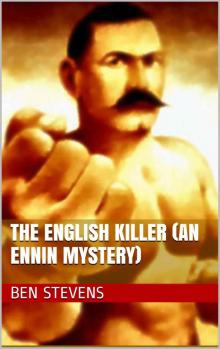 The English Killer (An Ennin Mystery) (The Ennin Mysteries Book 31)
The English Killer (An Ennin Mystery) (The Ennin Mysteries Book 31) The Ennin Mysteries: Collected Series 1 – 5 (25 Stories) MEGAPACK
The Ennin Mysteries: Collected Series 1 – 5 (25 Stories) MEGAPACK Tokyo Zombie Apocalypse
Tokyo Zombie Apocalypse The Strange Case of the Disappearing Dragon (An Ennin Mystery #32)
The Strange Case of the Disappearing Dragon (An Ennin Mystery #32) I, Hell
I, Hell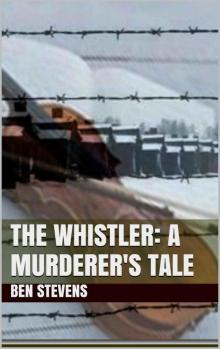 The Whistler: A Murderer's Tale
The Whistler: A Murderer's Tale Parker: The Story of an Apocalypse Survivor: COMPLETE SERIES
Parker: The Story of an Apocalypse Survivor: COMPLETE SERIES Confessions of a Japanese Temple Gardener: (P.S – Who's from London, England)
Confessions of a Japanese Temple Gardener: (P.S – Who's from London, England)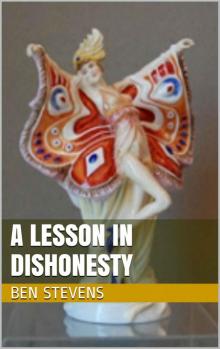 A Lesson in Dishonesty
A Lesson in Dishonesty The Sumo Wrestler (An Ennin Mystery #33)
The Sumo Wrestler (An Ennin Mystery #33)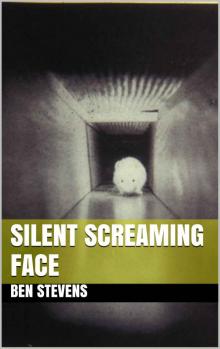 Silent Screaming Face
Silent Screaming Face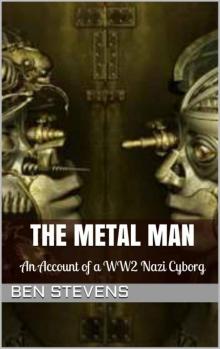 The Metal Man: An Account of a WW2 Nazi Cyborg
The Metal Man: An Account of a WW2 Nazi Cyborg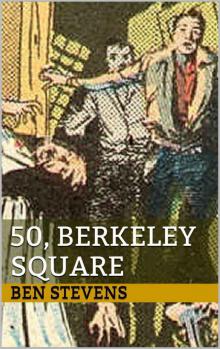 50, Berkeley Square
50, Berkeley Square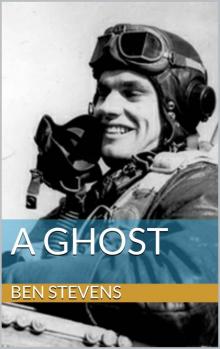 A Ghost
A Ghost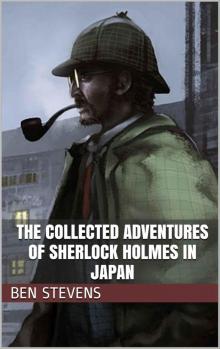 The Collected Adventures of Sherlock Holmes in Japan
The Collected Adventures of Sherlock Holmes in Japan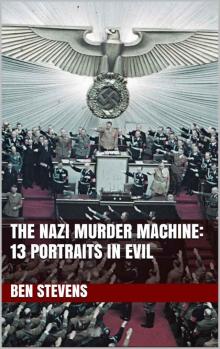 The Nazi Murder Machine: 13 Portraits in Evil
The Nazi Murder Machine: 13 Portraits in Evil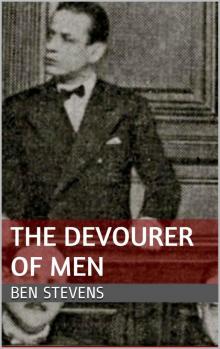 The Devourer of Men
The Devourer of Men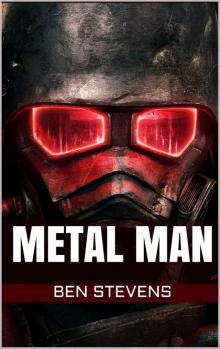 Metal Man
Metal Man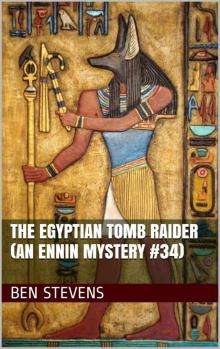 The Egyptian Tomb Raider (An Ennin Mystery #34)
The Egyptian Tomb Raider (An Ennin Mystery #34)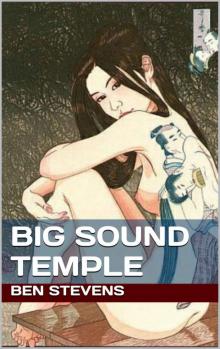 Big Sound Temple
Big Sound Temple The Ennin Mysteries: Collected Stories 26-30
The Ennin Mysteries: Collected Stories 26-30